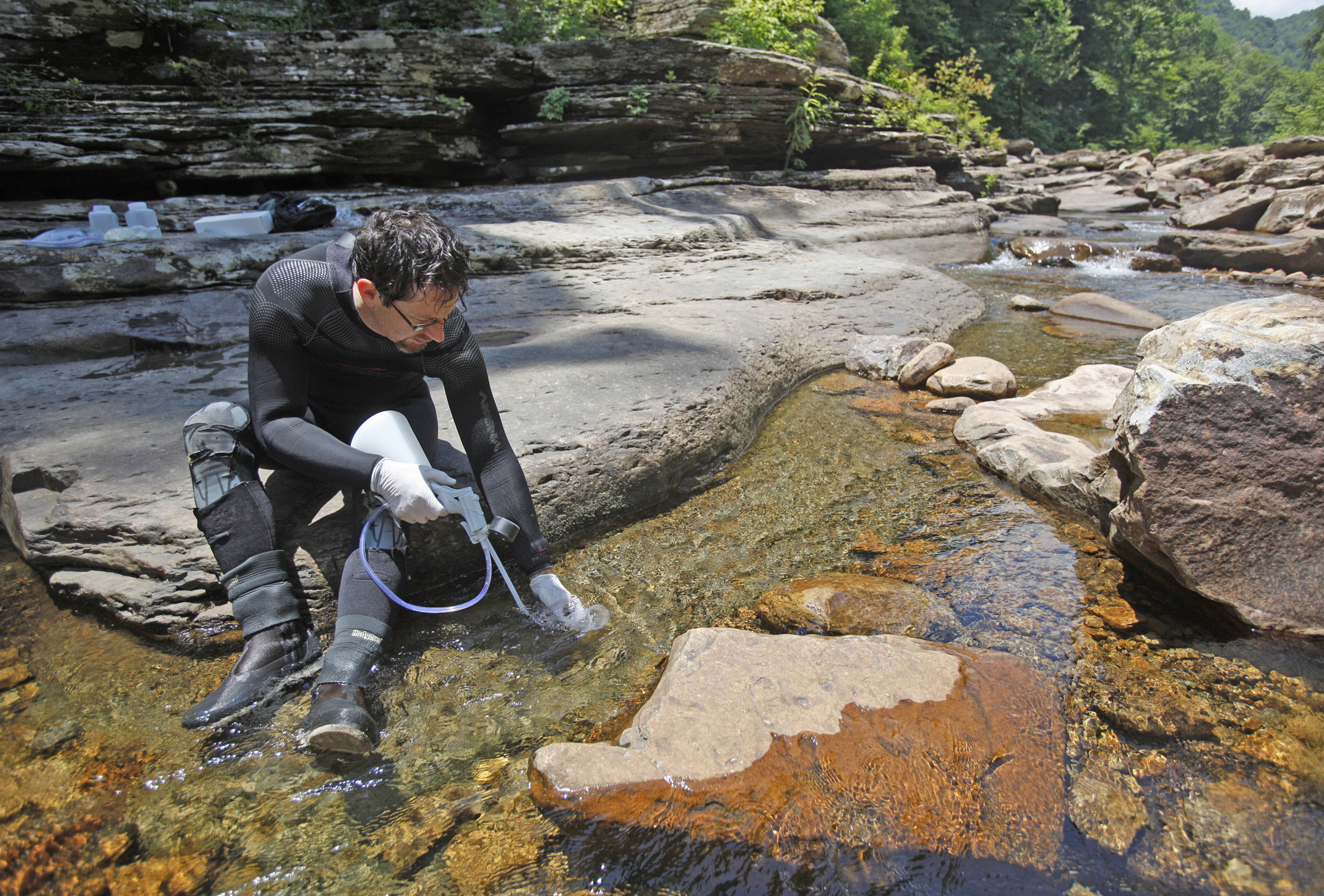Scientists test North Chickamauga Creek for hellbender salamander DNA (with video)
Friday, January 1, 1904
 Michael Freake, an associate professor of biology from Lee University, takes a water sample from North Chickamauga Creek on Monday. The water will be tested for DNA samples, which will hopefully tell researchers what kinds of animals have been in the creek. Researchers from the North Chickamauga Creek Conservancy, Lee University, and the Chattanooga Zoo searched a section of the North Chickamauga Creek for signs of hellbenders, a large species of salamander.
Michael Freake, an associate professor of biology from Lee University, takes a water sample from North Chickamauga Creek on Monday. The water will be tested for DNA samples, which will hopefully tell researchers what kinds of animals have been in the creek. Researchers from the North Chickamauga Creek Conservancy, Lee University, and the Chattanooga Zoo searched a section of the North Chickamauga Creek for signs of hellbenders, a large species of salamander.Hellbender facts
• The hellbender, or Cryptobranchus alleganiensis, is North America's largest salamander, ranging from 11 to 29 inches.• It inhabits clean, fast-flowing streams and rivers, where large flat rocks provide plenty of cover.• It has small eyes in a large flattened head. It has slimy skin secretions and loose folds of skin along the sides of the body that contribute to its bizarre look.• Hellbenders are nocturnal and search at night for small fish and crayfish.• Once abundant, hellbenders have declined throughout much of their range because of sedimentation, dams and pollution.Source: Tennessee Wildlife Resources Agency
Five snorklers were on the prowl, looking for an elusive ambushing predator in the upper region of North Chickamauga Creek on Monday.
They didn't find him -- or any of his hellbender kind. But they won't give up.
The past three decades have been very hard on the eastern hellbenders of the Appalachian Mountains and Midwest, according to David Hedrick, lead ectotherm keeper for the Chattanooga Zoo at Warner Park.
Poor stream quality -- primarily because of siltation, agricultural chemicals and acid mine runoff from old unreclaimed or poorly reclaimed mines -- have taken a toll.
"They are functionally extinct in North Mississippi, North Alabama and Northwest Georgia, Hedrick said.
"Northeast Georgia is a little better, and Tennessee has some populations. But pretty much there are only three watersheds where hellbenders are doing well. And that puts them [as a species] at risk," he said.
But on Monday, Hedrick; Michael Freake, an associate professor of biology at Lee University in Cleveland; and the staff and volunteers of the North Chickamauga Creek Conservancy were not just looking for the salamander that can grow to 29 inches long.
They were also looking for hellbender DNA.
With state-of-the-art environmental DNA sampling, called eDNA, they can determine whether the creek is still habitat for the hellbender -- even if they don't find one of the shy water dogs, sometimes incorrectly called mud puppies.
Aquatic animals release a lot of DNA in their environment through shedding, waste products, injuries and laying eggs.
By taking water samples and filtering the sample for hellbender DNA, scientists can determine whether the creek remains a habitat for at least a few of the salamanders.
They hope to have the lab results by the end of the summer, before time runs out for the hellbenders.
"You can get a lot of people in the river and spend a lot of hours and maybe never see one. Then it's very easy to write off that river and say, 'The're not here. We don't need to worry about it,'" Freake said.
That could be the death knell for a species on the brink.
"They don't move much. They may not see another hellbender a mile away even if they live 20 years. So if we know they're here, but we might be able to help," Freake said.
The help might even come from the zoo.
Hedrick said he and other Chattanooga Zoo keepers hope this fall to become one of the first zoos where a captive breeding program might add to the numbers of the hellbender.
"We have a captive population at the zoo, [with] 13 animals and a 40-foot long replicated research stream that is off exhibit," Hedrick said.
The southeastern variety of hellbenders has never been bred in captivity, he said.
Contact staff writer Pam Sohn at 423-757-6346 or psohn@timesfreepress.com.
